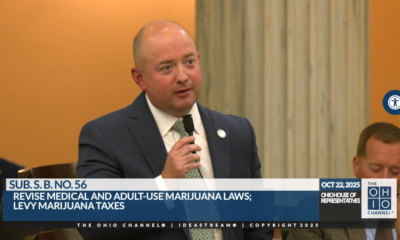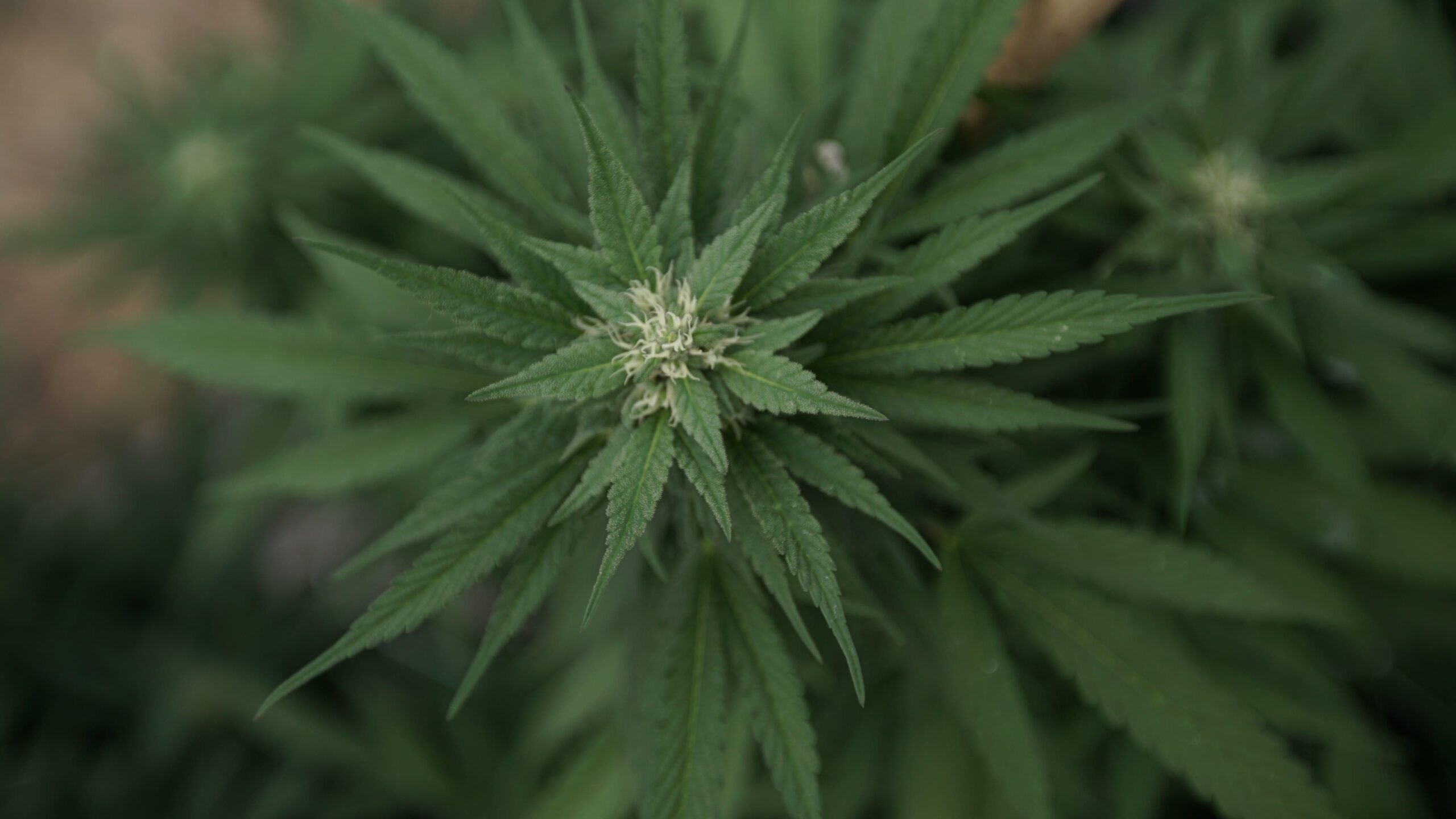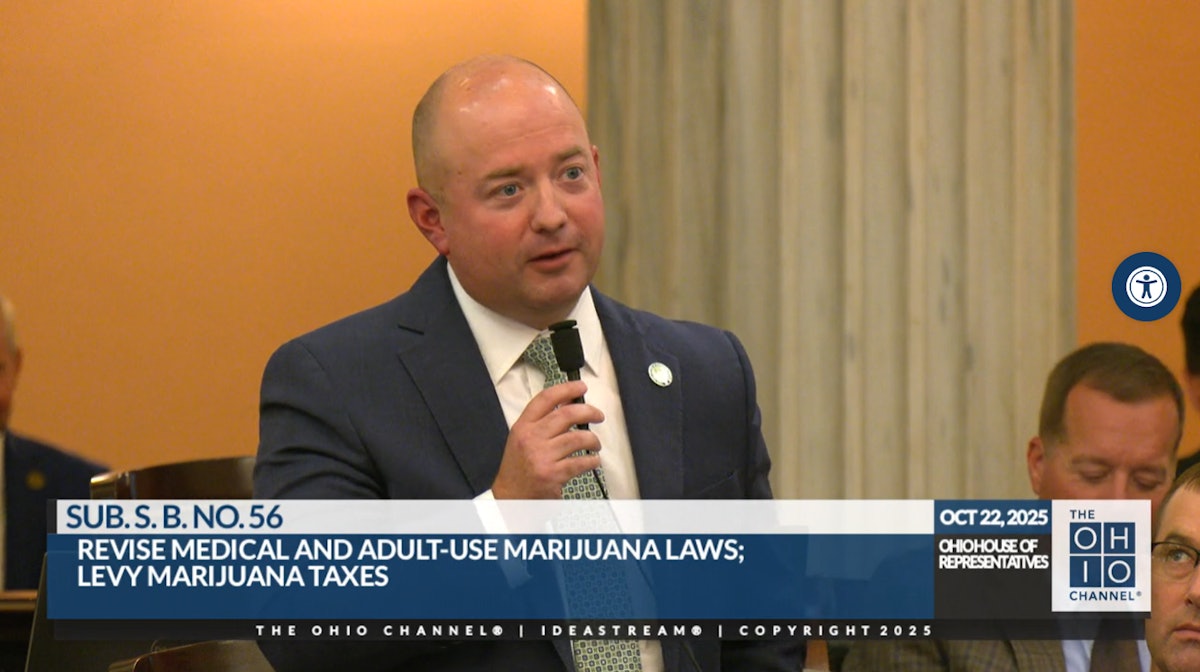featured
Pennsylvania Senators Will Vote On Bipartisan Cannabis Bill To Create New Regulatory Body Next Week
Published
6 days agoon

Pennsylvania lawmakers are scheduled to consider a bipartisan bill next week that would create a new regulatory body to oversee the state’s existing medical cannabis program while preparing to eventually handle the adult-use market as well.
About three months after the legislation was filed by Sen. Dan Laughlin (R) and 16 other members from across the aisle, the Senate Law & Justice Committee—which the sponsor chairs—is now set to take it up at a hearing on Tuesday.
While the proposal wouldn’t legalize adult-use cannabis as the lead sponsor has supported, it would establish a regulatory infrastructure that could be used to oversee such a program.
Laughlin, who has sponsored legalization bills in the past, previewed the measure in May, writing that Pennsylvania should first take steps to make sure the state is “ready to act when legalization becomes law” by establishing a Cannabis Control Board (CCB) now.
“Legalization of adult-use cannabis in Pennsylvania is no longer a matter of if, it is when. And when that day comes, the state should not be scrambling to build a regulatory system from scratch,” he said. “A transparent, efficient framework should already be in place, one designed to support a safe, well-regulated cannabis industry from day one.”
For now, however, the focus of the board would be on medical cannabis and hemp products.
In a press release sent when the legislation was filed, Laughlin said that “since the 2016 legalization of medical marijuana in Pennsylvania, the state Department of Health’s oversight of the Medical Marijuana Program has been glaringly inconsistent, inefficient and lacking transparency.”
“That coupled with the concerning unregulated intoxicating hemp products being proliferated across our commonwealth warrants the need for a dedicated regulatory board to eliminate these inconsistencies, enhance transparency and provide the structure needed to responsibly manage this industry,” he said. “One of the first tasks this board will tackle is regulating these intoxicating hemp products. Without proper oversight of these products, they will continue to thrive in this legal gray area and be sold without proper age guidelines, labeling and without the collection of any tax revenue.”
Laughlin said earlier this week that he anticipates President Donald Trump will federally reschedule marijuana ahead of the midterms next year. The president said in late August that he’d make a decision on the policy within weeks.
Two things I think @realDonaldTrump will do before the midterms, reschedule cannabis, and fix our broken health insurance system.
— Dan Laughlin (@VoteLaughlin) October 14, 2025
“We’re encouraged to see the Senate Law and Justice Committee take up a THC regulation bill as we believe it will advance a comprehensive discussion on THC regulation in the state,” Brit Crampsie, a spokesperson for the pro-legalization group ResponsiblePA told Marijuana Moment on Friday.
In a cosponsorship memo circulated earlier this year, Laughlin said his bill would “transfer regulatory control of the Medical Marijuana Program to the CCB, ensuring continuity, efficiency, and improved oversight of medical cannabis businesses and patient access.” It would further “establish uniform safety standards to protect consumers from untested and potentially harmful products.”
The bill text itself also doesn’t contain an explicit references to adult-use, or recreational, marijuana, and it would not enact legalization on its own. But the description indicates that the sponsors feel the current regulatory regime under the Pennsylvania Department of Health should be replaced with a more targeted agency that would ostensibly be suited to oversee an adult-use market if lawmakers move to end prohibition.
“By consolidating oversight under a single regulatory board, we can eliminate inconsistencies, enhance transparency, and provide the structure needed to responsibly manage this industry,” the memo says.
Most of the bill that’s going before committee describes the process of establishing the CCB, with details about the selection criteria and other procedural information. The duties section of the legislation lists various authorizations for the board, including members’ ability to conduct investigations, promulgate regulations, consult with other departments and more to achieve its oversight goals.
Meanwhile in Pennsylvania, bipartisan senators earlier this month introduced a bill that would allow terminally ill patients to use of medical marijuana in hospitals.
This comes as state lawmakers continue to push for adult-use marijuana legalization in the commonwealth.
—
Marijuana Moment is tracking hundreds of cannabis, psychedelics and drug policy bills in state legislatures and Congress this year. Patreon supporters pledging at least $25/month get access to our interactive maps, charts and hearing calendar so they don’t miss any developments.![]()
Learn more about our marijuana bill tracker and become a supporter on Patreon to get access.
—
A top aide to Pennsylvania’s governor said last month, however, that lawmakers should stop introducing new competing legalization bills and instead focus on building consensus on the issue—while emphasizing that any measure that advances needs to contain equity provisions if the governor is going to sign it into law.
Laughlin, for his part, said in August that the House “needs to pass the language in my bill and send it to my committee” after which point he “can negotiate with the Senate and the governor.”
The Democratic-controlled House, however, has already advanced a legalization proposal this session that called for a state-run sales model. That measure was quickly quashed in Laughlin’s Senate committee, however, with the GOP lawmaker and others insisting that a more traditional approach of licensing privates businesses would have a better shot.
Laughlin separately said recently that supporters are “picking up votes” to enact the reform this session.
Gov. Josh Shapiro (D), for his part, said last month that he won’t “concede” on his plan to legalize adult-use cannabis through the budget.
Meanwhile, the leading Republican candidate in the race to become the next governor of Pennsylvania dodged a question about her stance on legalizing marijuana—saying she doesn’t have a “policy position” on the issue and arguing that the sitting governor’s proposal for reform “way, way overstated” potential revenue.
The candidate, Pennsylvania Treasurer Stacy Garrity (R), pointed to neighboring Ohio, which launched its own adult-use cannabis market this year, saying “they generated about $115 million in revenue.” And while the populations of both states are relatively comparable, Shapiro’s budget projected $536.5 million in cannabis revenue in the first fiscal year of implementation.
She did, however, say that if Pennsylvania moves forward on enacting the reform, she’ll “make sure that it’s banked appropriately.”
Meanwhile, a Pennsylvania Democratic senator recently said that federal marijuana rescheduling would be “very influential” in advancing legalization in his state, giving “political cover” to GOP members on the fence about reform.
Sen. Sharif Street (D) discussed the status of cannabis legalization efforts in the Keystone State, including a bipartisan proposal to end prohibition that he filed alongside Laughlin in July.
The legalization bill with a state-run sales model that passed the House isn’t necessarily dead for the session as a vehicle to advance reform, however. And Democrats in the chamber recently called on voters to pressure state senators to sign off on the cannabis measure, arguing that it would benefit health and safety and bring in billions of dollars in revenue for the commonwealth.
Polls have shown bipartisan support for legalization among voters, but the reform has consistently stalled in the legislature, due largely to GOP opposition. But not all Republican members are against the policy change—and one recently said she felt her party should seize the “opportunity to snatch” the issue from Democrats.
In addition to pushback from Senate Majority Leader Pittman, another Republican, Sen. Scott Martin, who chairs the influential Appropriations Committee, said earlier this month that he didn’t plan to move on any adult-use legalization bills.
Separately, just days after Laughlin and Street filed their measure, Reps. Emily Kinkead (D) and Abby Major (R)—alongside eight other cosponsors—filed legislation in the House to enact the reform. The pair have previously championed other proposals to end prohibition.
Laughlin and 16 other lawmakers also recently filed a separate bill to create a new regulatory body in the state that would begin overseeing medical cannabis while preparing to eventually handle the adult-use market as well.
Separately, a recent poll found that Pennsylvania voters say they favor a model where cannabis is sold by licensed private businesses rather than through a system of state-run stores.
Meanwhile, a Democratic lawmaker recently filed a bill that seeks to require employers to cover the costs of medical cannabis for qualifying patients receiving workers’ compensation.

Author: mscannabiz.com
MScannaBIZ for all you Mississippi Cannabis News and Information.
You may like
-


SCOTUS cannabis & guns case gets delay request (Newsletter: October 24, 2025)
-


Ohio House Passes Cannabis, Hemp Bill Resulting From ‘Venn Diagram From Hell’
-


What To Know About Cannabis And A Brain Aneurysm
-


MariMed to Expand Brand Distribution to New York
-


Time for a Cannabis Reboot: Local Roots, Fair Markets, Real Change
-


Ohio Health Agency Grants $400,000 To Fund Psychedelics Education And Training For First Responders, Doctors And More
featured
SCOTUS cannabis & guns case gets delay request (Newsletter: October 24, 2025)
Published
24 minutes agoon
October 24, 2025
Whiskey company cites marijuana in scaling back biz; OH psychedelics grant; Study: Cannabis tied to reduced alcohol liver disease
Subscribe to receive Marijuana Moment’s newsletter in your inbox every weekday morning. It’s the best way to make sure you know which cannabis stories are shaping the day.
Your support makes Marijuana Moment possible…
Hold on, just one second before you read today’s news. Have you thought about giving some financial support to Marijuana Moment? If so, today would be a great day to contribute. We’re planning our reporting for the coming months and it would really help to know what kind of support we can count on.
Check us out on Patreon and sign up to give $25/month today:
https://www.patreon.com/marijuanamoment
/ TOP THINGS TO KNOW
Trump administration Solicitor General D. John Sauer submitted a request for a delayed timeline to file briefs in a marijuana and gun rights case that the Supreme Court is taking up—with the respondent’s lawyers agreeing to the extension.
The Ohio Department of Behavioral Health is supporting a program to educate first responders, police and healthcare professionals about how to deal with adverse psychedelic experiences with a $400,000 grant.
Whiskey company Heritage Distilling is scaling back its operations, citing “consumer shifts toward reduced alcohol consumption and alternative products, including marijuana.”
A new study found that marijuana use is “associated with a reduced risk of [alcohol-associated liver disease], with the greatest risk reduction seen in patients with” so-called “cannabis use disorder.”
- “Cannabis use was linked to lower risks of ALD, liver-related complications and death compared to non-cannabis users.”
NORML activist Chris Goldstein argues in a new Marijuana Moment op-ed that New Jersey gubernatorial candidates in next month’s election “barely seem to be paying attention” to issues of concern for cannabis consumers.
West Virginia officials are refusing to allocate $34 million in medical cannabis revenue that is supposed to support drug treatment, research and law enforcement programs over concerns about federal prohibition.
- “The money in the fund will remain unallocated until federal law changes.”
/ FEDERAL
Rep. Brittany Pettersen (D-CO) inserted remarks into the Congressional Record congratulating an attorney for being named “lawyer of the year” and noting that he “helped create regulations for recreational marijuana.”
/ STATES
Minnesota Gov. Tim Walz (D) signed another cannabis compact with a tribe.
The Kentucky legislature’s Interim Joint Committee on Health Services held a hearing on the rollout of the state’s medical cannabis program.
A Wisconsin senator said he’s optimistic a medical cannabis legalization bill will pass the Senate.
Rhode Island’s former top marijuana regulator announced she is running for attorney general.
Washington, D.C. regulators adopted changes to medical cannabis rules.
The New Mexico Medical Cannabis Advisory Board will meet on Monday.
—
Marijuana Moment is tracking hundreds of cannabis, psychedelics and drug policy bills in state legislatures and Congress this year. Patreon supporters pledging at least $25/month get access to our interactive maps, charts and hearing calendar so they don’t miss any developments.![]()
Learn more about our marijuana bill tracker and become a supporter on Patreon to get access.
—
/ LOCAL
New York City mayoral candidates weighed in on safe consumption sites for illegal drugs during a debate.
/ INTERNATIONAL
Zurich, Switzerland officials are moving to extend a legal cannabis sales pilot project.
/ SCIENCE & HEALTH
A study highlighted the “potential of [unsaponifiable matter from hemp seed] as a natural anti-obesity therapeutic, offering new avenues for the treatment and prevention of obesity and related metabolic disorders.”
A study found that “MDMA increases feelings of trust in the social world.”
/ BUSINESS
Emerald Intel acquired Cannabiz Media.
IM Cannabis Corp. signed a non-binding indicative term sheet to acquire a 60 percent equity interest in a quantum computing bio data company.
Circle K plans to begin selling hemp-derived THC drinks nationwide in 2026.
Village Farms International, Inc. launched a one-way aroma valve built directly into its cannabis flower packaging.
Make sure to subscribe to get Marijuana Moment’s daily dispatch in your inbox.
Photo courtesy of Chris Wallis/Side Pocket Images.

Author: mscannabiz.com
MScannaBIZ for all you Mississippi Cannabis News and Information.
featured
Ohio House Passes Cannabis, Hemp Bill Resulting From ‘Venn Diagram From Hell’
Published
10 hours agoon
October 23, 2025
Ohio House lawmakers passed the 18th version of a bill on Oct. 22 that aims to alter the state’s adult-use cannabis laws that voters approved in 2023, while also creating a tightly defined regulatory framework for hemp products.
The 228-page legislation, Substitute Senate Bill 56, preserves many aspects of the voter-approved initiative, such as home grows (six per adult or 12 per household), sharing between adults 21 and older, and allocating 36% of cannabis excise tax revenues to local municipalities that host dispensaries.
However, the bill would prohibit public consumption at places like music concerts and bar patios, and those caught with cannabis purchased outside the state would be criminalized. No other state where cannabis is legal imposes such restrictions on out-of-state purchases, according to cannabis advocacy group NORML.
In addition, while adults could continue to home cultivate cannabis under the legislation, they’d be restricted to harvesting more than 2.5 ounces of flower, or roughly one plant, with a felony penalty for those who grow more than the number of plants allowed. Also, the bill intends to place a 35% THC cap on flower and a 70% THC cap on extracts for both medical and adult-use cannabis.
“This isn’t what Ohioans voted for, and the fact that this bill is being rushed through the Legislature, with almost no opportunity for public comment, indicates that lawmakers know they are undermining the will of the voters,” NORML Political Director Morgan Fox said in a public statement. “Regardless of where one stands on cannabis issues, everyone should be outraged at this.”
The substitute bill found bipartisan House support in an 87-8 vote on Oct. 22.
Rep. Brian Stewart, R-Ashville, who carried Sub. S.B. 56 in the House, said Wednesday on the chamber floor that the bill “preserves all of the core aspects” of what voters passed two years ago, including access to tested and regulated products from licensed dispensaries.
Stewart also argued that the Legislature has to act to preserve the 36% tax revenue fund for host communities after the Ohio Department of Taxation flagged language in the voter-approved initiative, suggesting that the language failed to properly appropriate the money.
“It was always going to require legislation in this chamber,” he said.
The substitute bill also intends to establish a legal pathway for licensed “hemp dispensaries” to sell regulated and tested intoxicating hemp products, defined as containing more than 0.5 milligrams of delta-9 THC per serving or 2 milligrams per package, or more than 0.5 milligrams of total non-delta-9 THC per package. These sales would be limited to those 21 and older. Those who sell intoxicating hemp products to those under 21 would be guilty of a misdemeanor on the first offense and a felony on a subsequent offense.
Meanwhile, cannabinoid hemp beverages would be defined and regulated differently with a $1.20-per-gallon excise tax (more on this later).
Stewart said provisions included in the 18th version of the substitute bill resulted from a “Venn diagram from hell” that attempted to balance individual liberties, consumer safety, the financial well-being of local communities, and the “need to protect the health and safety” of Ohio children.
“If you’re reading through it and you’re saying, ‘Rep. Stewart, I don’t like Section X, I don’t like Section Y,’ please know you’re in good company. I don’t either,” he said. “This is not the bill that I originally introduced. It’s not the bill that Representative [Tex] Fischer originally introduced. But it is a carefully crafted compromise that makes Ohio better.”
While the Senate passed its version of the legislation in February, cannabis advocacy groups like the Marijuana Policy Project applauded the House Judiciary Committee for sitting on the legislation for nearly eight months as a means to prevent recriminalization measures “pushed by the Senate.”
However, many House members said during this week’s floor debate that Gov. Mike DeWine’s executive order issued Oct. 8 – one that attempts to shut down hemp-derived cannabinoid product sales and initiate emergency rulemaking – spurred lawmakers to go back to the drawing board for a legislative fix.
DeWine showcased various intoxicating hemp products in packaging that mimicked popular candies, like Nerds, Sour Patch Kids and Gushers, during his Oct. 8 press conference.
After lawmakers were at an impasse, DeWine’s executive order represented a turning point on Sub. S.B. 56, Rep. Tex Fischer, R-Boardman, said before Wednesday’s floor vote.
“I think we all had an agreement that that was not the intent of the hemp legislation at the federal level or here in Ohio, but we did need to do something to protect kids from these products,” he said. “Some of these products are truly illicit and truly dangerous, and everybody, no matter how fervent of an activist on the hemp side of this issue you were, agreed something needed to be done.”
Legislative disagreements had revolved around Ohio businesses that would be negatively impacted by language in previous versions of the bill, Fischer said.
Under the House-passed substitute bill, places where children “walk freely,” like gas stations and grocery stores, would be prohibited from selling intoxicating hemp products, while certain intoxicating hemp retailers, such as a qualifying vape shop, would be “grandfathered in” for licensure.
For a retailer to qualify for a grandfathered-in hemp dispensary license, that retailer must have sold intoxicating hemp products on or before Aug. 30, and the store’s receipts from hemp and intoxicating hemp product sales must have exceeded 80% of its total gross receipts for either the past 12 months or the 2024 calendar year.
“What about those people that have poured their blood, sweat, tears, years of work, potentially millions of dollars into building a business living by the rules that we set out, whether they were adequate or not, they were not breaking the law,” Fischer said. “Those were the people that I was motivated to stand up for, and while this bill doesn’t do everything that I wanted or everything that others want, I believe we have arrived at a reasonable conclusion to allow those people to still stay in business, to grandfather them into this new regulatory regime.”
No one under the age of 21 would be allowed inside these hemp dispensaries, which would be prohibited from selling cigarettes, tobacco, and vape or electronic smoking products under the bill. No more than 400 hemp dispensaries would be allowed in the state, unless those grandfathered in exceed that number.
While the biennial license renewal fee for Ohio’s cannabis dispensaries is $70,000, the two-year renewal license fee for a grandfathered-in hemp dispensary would be $35,000 under Sub. S.B. 56.
Meanwhile, hemp beverages, which the substitute bill defines as “drinkable cannabinoid products,” would be regulated differently. In addition, these products would be classified as low-level DCPs (5 milligrams or less of total THC per serving) or high-level DCPs (5-10 milligrams of total THC per serving). Only one serving per container would be allowed.
Neither low-level nor high-level DCPs would constitute an “intoxicating hemp product,” with DCPs falling under a separate regulatory framework for manufacturers, distributors and retailers. Still, sales to those under 21 would be prohibited.
Ohio retailers with Class C liquor licenses, such as grocery stores that sell alcohol for carryout only, would be allowed to sell high-level DCPs. Meanwhile, Ohio retailers with licenses for on-site consumption, such as restaurants and bars, would be allowed to sell low-level DCPs.
While the substitute bill would allow DCP manufacturers to create higher-dose beverages that contain more than 10 milligrams of THC, they would be restricted to distributing and/or selling those products to out-of-state partners.
Fischer said there were a lot of wins “for us so-called ‘hemp-resentatives,’” in the substitute bill.
“Many of you heard from beverage manufacturers, bars, restaurants, retailers about how popular these products are, but there are also a lot of folks that weren’t yet comfortable stocking these products because of the regulatory uncertainty that is a result of our inability to previously come to an agreement here in Columbus,” he said. “I think this strikes the appropriate tone of a reasonable, fair and pro-business regulatory regime while still maintaining that these products and consumers should be safe.”
While it’s unclear if the Senate will agree to the House’s amended substitute bill or take the legislation to a conference committee for further debate – before possibly sending the bill to DeWine’s desk – the potential outcomes are significant for Ohio stakeholders: cannabis businesses, hemp businesses, consumers, patients and children.
Rep. Jamie Callender, R-Concord, a long-time advocate for cannabis reform in the Buckeye State, acknowledged the legislation “is not perfect” before voting to support the bill.
Callender said a “no” vote on the legislation represents allowing retailers to continue selling high-THC products to children walking home from schools with impunity.
“I imagine everybody in this room can find at least one thing they don’t like in the bill, one thing they think can be improved on,” he said. “You have my commitment. I’ll keep working with everyone to make it better, but I believe we have to act.”

Author: mscannabiz.com
MScannaBIZ for all you Mississippi Cannabis News and Information.
featured
What To Know About Cannabis And A Brain Aneurysm
Published
11 hours agoon
October 23, 2025
Discover what to know about cannabis and a brain aneurysm—risks, recovery, and medical cautions.
When celebrity Kim Kardashian recently revealed she was diagnosed with a small brain aneurysm—reportedly detected during a routine MRI and attributed by her doctors to stress—her disclosure sparked interest in a condition most people don’t know much about. A brain aneurysm is a bulging or ballooning blood vessel in the brain, which can be life-threatening if it ruptures. With growing interest around cannabis use—both medically and recreationally—it’s worth exploring what to know about cannabis and a brain aneurysm.
RELATED: The Science Behind Cannabis And Happiness
A brain aneurysm (sometimes called an intracranial aneurysm) occurs when a weakened area of a blood vessel in the brain bulges outward. If the aneurysm ruptures, it can lead to a major bleed called a subarachnoid hemorrhage—a medical emergency. Many aneurysms remain small and never rupture, but risk factors include high blood pressure, smoking, genetic predisposition, and possibly vascular stress. Kim Kardashian’s case underlines how even individuals with public profiles and access to healthcare can face this silent risk.

Cannabis—or more precisely its components such as cannabidiol (CBD) and tetrahydrocannabinol (THC)—has been studied for a variety of health issues. For some conditions like chronic pain, certain forms of epilepsy, or spasticity in multiple sclerosis, cannabinoids may offer symptomatic relief. There is emerging evidence medical marijuana can improve quality of life for some patients: reducing pain, improving sleep or mood, and even decreasing reliance on opioids in certain contexts.
In the broad sense, in jurisdictions across the U.S., many patients use it under medical supervision for conditions like migraine, nausea from chemotherapy, or chronic neuropathic pain. “Medical” use does not equate to “safe in all contexts”—especially when other serious medical issues are present.
When it comes to brain aneurysms—particularly after diagnosis or treatment—the research raises caution flags about cannabis use:
- Studies show people who have had an aneurysmal subarachnoid hemorrhage (a burst aneurysm), cannabis users had higher rates of delayed cerebral ischemia (DCI)—a serious complication which can lead to poor outcome. One large study found cannabis users had about a 2.7 times greater risk of DCI compared with non-users.
- Other studies link recreational cannabis use to a higher likelihood of having an aneurysm rupture in the first place—one estimate suggested about an 18 % increased risk.
- Research also suggests cannabis affects vascular tone, cerebral blood flow, mitochondrial function in brain cells, and may contribute to vasospasm (narrowing of blood vessels) or oxidative stress—mechanisms which are particularly concerning in someone with a vulnerable blood vessel wall.
- One review warned even for unruptured aneurysms, if cannabis is used, individuals should be aware they may face worse outcomes should rupture occur.
RELATED: Evidence About Burning Mouth Syndrome And Cannabinoids
If you or someone you know has been diagnosed with a brain aneurysm (ruptured or unruptured), here are some practical steps:
- Talk to your neurologist/neurosurgeon about cannabis use. The research suggests elevated risks in people with aneurysms who use cannabis.
- Avoid assuming “medical use = safe.” Even if you’re using cannabis under a physician’s care, an aneurysm changes the risk profile.
- Focus on established risk-reduction: control blood pressure, stop smoking, manage cholesterol, avoid stimulants. These traditional strategies remain foundational.
- If you have an untreated aneurysm and are considering cannabis for medical reasons, proceed with caution.Ask your medical team about the specific size, location, treatment plan of your aneurysm and whether there are recommended restrictions.
- After an aneurysm rupture or treatment, strongly consider abstaining or closely monitoring any cannabis use. The data indicate increased complication rates in this particular setting.
The public disclosure by Kim Kardashian highlights how common aneurysms may be, but it also reminds us the decision to use cannabis in a medical context should be made carefully. While cannabis offers genuine medical benefits for some conditions, when a brain aneurysm is in the picture—especially one which has ruptured or is being observed—caution is warranted. Speak with a neurologist familiar with cerebrovascular risk, weigh the benefits and the unique risks, and make an informed choice rather than assuming “legal = safe.”

Author: mscannabiz.com
MScannaBIZ for all you Mississippi Cannabis News and Information.

SCOTUS cannabis & guns case gets delay request (Newsletter: October 24, 2025)

Ohio House Passes Cannabis, Hemp Bill Resulting From ‘Venn Diagram From Hell’

What To Know About Cannabis And A Brain Aneurysm

MariMed to Expand Brand Distribution to New York

Time for a Cannabis Reboot: Local Roots, Fair Markets, Real Change

Ohio Health Agency Grants $400,000 To Fund Psychedelics Education And Training For First Responders, Doctors And More

Curio Wellness Acquires 4 Greenlight Dispensaries in Missouri

The best places to be high in Seattle

Colombia’s Bold Offer to Trump: Legal Weed Exports for Peace

Trump DOJ Asks Supreme Court For Delayed Schedule In Case On Marijuana Users’ Gun Rights

Whiskey Company Scales Back Operations, Citing ‘Consumer Shifts’ Toward Marijuana As Alcohol Alternative

Smart Cannabis: The AI Revolution No Operator Can Ignore

New Jersey Gubernatorial Candidates Need To Step Up For Cannabis Consumers (Op-Ed)

Millennials Are Spending Big on Luxury Travel

West Virginia Medical Marijuana Revenue Is Supposed To Support Drug Treatment Programs, But Sits Unspent As Officials Worry About Federal Prohibition

Frequent Marijuana Use Is Tied To Lower Risk Of Liver Disease From Alcohol, New Study Finds

Ohio bill to scale back cannabis legalization passed by House (Newsletter: October 23, 2025)

FDA Weighs Petition On ‘Significant Harm’ Of Marijuana Hair Testing Device’s Positive Results From Secondhand Smoke

Wisconsin Lawmakers Rally for Medical Cannabis Legalization in Committee Hearing

Massachusetts Campaign To Roll Back Marijuana Legalization Law Is ‘On Track’ To Make 2026 Ballot, Spokesperson Says

Village Farms Introduces Industry-First, One-Way Aroma Valve in Cannabis Packaging

Ohio House Passes Bill To Remove Voter-Approved Marijuana Legalization Protections And Restrict Hemp Market

Sorting Robotics Becomes Cannabis Manufacturing’s First True Systems Integrator

Wisconsin Senators Hold Hearing On GOP Leader’s New Medical Marijuana Legalization Bill

Alert: Department of Cannabis Control updates data dashboards with full data for 2023

Connecticut Appoints The US’s First Cannabis Ombudsperson – Yes there is a pun in there and I’m Sure Erin Kirk Is Going To Hear It More Than Once!

5 best CBD creams of 2024 by Leafly

Recreational cannabis on ballot for third time in South Dakota

EU initiative begins bid to open access to psychedelic therapies
New Study Analyzes the Effects of THCV, CBD on Weight Loss

Free delta-9 gummies from Bay Smokes

5 best autoflower seed banks of 2024 by Leafly

Discover New York’s dankest cannabis brands [September 2024]

May 2024 Leafly HighLight: Pink Runtz strain

Press Release: CANNRA Calls for Farm Bill to Clarify Existing State Authority to Regulate Hemp Products

5 best THC drinks of 2024 by Leafly

Local medical cannabis dispensary reacts to MSDH pulling Rapid Analytics License – WLBT

6 best CBD gummies of 2024 by Leafly

Curaleaf Start Process Of Getting Their Claws Into The UK’s National Health System – With Former MP (Resigned Today 30/5/24) As The Front Man

Horn Lake denies cannabis dispensary request to allow sale of drug paraphernalia and Sunday sales | News

5 best delta-9 THC gummies of 2024 by Leafly

The Daily Hit: October 2, 2024

Mississippi city official pleads guilty to selling fake CBD products

Nevada CCB to Accept Applications for Cannabis Establishments in White Pine County – “Only one cultivation and one production license will be awarded in White Pine County”

Weekly Update: Monday, May 13, 2024 including, New Guide for Renewals & May Board meeting application deadline

5 best THCA flower of 2024 by Leafly

6 best hemp pre-rolls of 2024 by Leafly

PRESS RELEASE : Justice Department Submits Proposed Regulation to Reschedule Marijuana
Trending
-

 California Cannabis Updates1 year ago
California Cannabis Updates1 year agoAlert: Department of Cannabis Control updates data dashboards with full data for 2023
-

 Breaking News1 year ago
Breaking News1 year agoConnecticut Appoints The US’s First Cannabis Ombudsperson – Yes there is a pun in there and I’m Sure Erin Kirk Is Going To Hear It More Than Once!
-

 best list1 year ago
best list1 year ago5 best CBD creams of 2024 by Leafly
-

 Business1 year ago
Business1 year agoRecreational cannabis on ballot for third time in South Dakota
-

 Business1 year ago
Business1 year agoEU initiative begins bid to open access to psychedelic therapies
-

 cbd1 year ago
cbd1 year agoNew Study Analyzes the Effects of THCV, CBD on Weight Loss
-

 Bay Smokes1 year ago
Bay Smokes1 year agoFree delta-9 gummies from Bay Smokes
-

 autoflower seeds1 year ago
autoflower seeds1 year ago5 best autoflower seed banks of 2024 by Leafly



